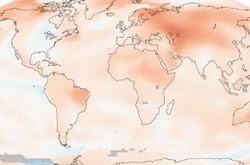 South American scientists "heated" Land for 15 seconds. Specialists in the field of climatology and space research presented visualization of global warming from the 1950s to the year 2013. Professionals had time for a brief moment to demonstrate 64 years of climate change on the planet. South American scientists "heated" Land for 15 seconds. Specialists in the field of climatology and space research presented visualization of global warming from the 1950s to the year 2013. Professionals had time for a brief moment to demonstrate 64 years of climate change on the planet.
The UNIVERSITIES space research center at NASA showed how the average temperature of the Earth modern days began to differ from the beginning of the 2nd half of the twentieth century. In the updated report researchers became the latest data for 2013.
The average temperature of the last 12 months amounted to 14.6 degrees above zero. This sign was up 0.6 C in comparison with the middle of the XX century. Since 1880, the average annual temperature has risen by 0.8 degrees. According to scientists, climate change will continue in 2014.
Researchers at NASA announced that the latest data once again confirmed the trend of global warming. The causes of this process, according to them, remain unchanged. Climate change contribute to the emission of carbon dioxide and methane into the atmosphere.
Note that the problem of global warming is one of the key environmental issues of the Earth. Almost all changes in the behavior and style of life of animals and plants development scientists associated specifically with global warming.
In addition, climate change impact on the financial position, particularly in the agricultural States, and people often take up arms in case of deterioration in financial conditions, according to RIA Novosti. Do you think scientists, the number of wars, armed conflicts and global unrest by 2050 may increase one and a half times when later generations will not be able to adapt to temperature fluctuations better own ancestors.
<iframe width="560" height="315" src="//www.youtube.com/embed/gaJJtS_WDmI?rel=0" frameborder="0" allowfullscreen></iframe>
sections: Society, World News
|